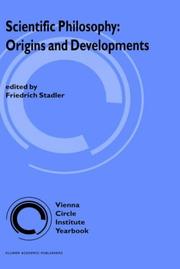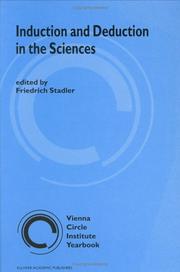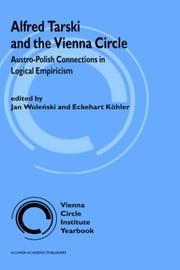| Listing 1 - 6 of 6 |
Sort by
|

ISBN: 9789048143320 9048143322 0792325265 9401729646 Year: 2011 Publisher: Dordrecht ; London : Springer,
Abstract | Keywords | Export | Availability | Bookmark
 Loading...
Loading...Choose an application
- Reference Manager
- EndNote
- RefWorks (Direct export to RefWorks)
Science --- Sciences --- Philosophy --- Congresses. --- Philosophie --- Congrès

ISBN: 140201967X 1402021968 Year: 2004 Publisher: Dordrecht : Kluwer academic,
Abstract | Keywords | Export | Availability | Bookmark
 Loading...
Loading...Choose an application
- Reference Manager
- EndNote
- RefWorks (Direct export to RefWorks)
Induction (Logic). --- Logic, Symbolic and mathematical. --- Logic. --- Science --- Methodology.
Book
ISBN: 3709115779 Year: 2014 Publisher: Vienna : Springer Vienna : Imprint: Springer,
Abstract | Keywords | Export | Availability | Bookmark
 Loading...
Loading...Choose an application
- Reference Manager
- EndNote
- RefWorks (Direct export to RefWorks)
„Der Mann ohne Eigenschaften“ zeigt die ambivalenten Bezüge Musils zur Moderne des frühen 20. Jahrhunderts auf und schließt daraus auf sein Lebenswerk, den „Mann ohne Eigenschaften“. Dabei soll auf den Wiener Kreis und seine erkenntnistheoretischen Debatten im Rahmen der Modernisierung der (Natur-) Wissenschaften eine parallele Reflexion des Umgangs mit der Rationalität und der Rationalitätskritik hingezeigt werden, die als Kontrastfolie für eine Deutung von Musils (Selbst-) Positionierung gegenüber der modernen Rationalität herangezogen wird. Arslan regt dazu an Musils Werk und seine poetologischen Kategorien wie z.B. die Dichotomie „ratioïd/nicht-ratioïd“ oder den „Möglichkeitssinn“ unter dem Aspekt der Ideen und Debatten des Wiener Kreises zu diskutieren, bzw. dazu anregen, intensiveren und intertextuellen Forschungen nachzugehen.
Language and languages --- Philosophy of Language. --- Stylistics. --- Philosophy. --- Style.
Book
ISSN: 09296328 ISBN: 1280624787 9786610624782 1402041012 Year: 2006 Volume: 12 Publisher: Dordrecht ; [London] : Springer,
Abstract | Keywords | Export | Availability | Bookmark
 Loading...
Loading...Choose an application
- Reference Manager
- EndNote
- RefWorks (Direct export to RefWorks)
The Institute Vienna Circle held a conference in Vienna in 2003, Cambridge and Vienna – Frank P. Ramsey and the Vienna Circle, to commemorate the philosophical and scientific work of Frank Plumpton Ramsey (1903–1930). This Ramsey conference provided not only historical and biographical perspectives on one of the most gifted thinkers of the Twentieth Century, but also new impulses for further research on at least some of the topics pioneered by Ramsey, whose interest and potential are greater than ever. Ramsey did pioneering work in several fields, practitioners of which rarely know of his important work in other fields: philosophy of logic and theory of language, foundations of mathematics, mathematics, probability theory, methodology of science, philosophy of psychology, and economics. There was a focus on the one topic which was of strongest mutual concern to Ramsey and the Vienna Circle, namely the question of foundations of mathematics, in particular the status of logicism. Although the major scientific connection linking Ramsey with Austria is his work on logic, to which the Vienna Circle dedicated several meetings, certainly the connection which is of greater general interest concerns Ramsey's visits and discussions with Wittgenstein. Ramsey was the only important thinker to actually visit Wittgenstein during his school-teaching career in Puchberg and Ottertal in the 1920s, in Lower Austria; and later, Ramsey was instrumental in getting Wittgenstein positions at Cambridge.
Vienna circle --- Ramsey, Frank Plumpton, --- Arts and Humanities --- Philosophy --- Philosophy. --- Logic. --- Language and languages --- Philosophy and science. --- Mathematical logic. --- History of Philosophy. --- Philosophy, general. --- Philosophy of Language. --- Philosophy of Science. --- Mathematical Logic and Foundations. --- Viennese circle --- Wiener Kreis --- Philosophers --- Logical positivism --- Ramsey, F. P. --- Philosophy (General). --- Linguistics --- Science --- Logic, Symbolic and mathematical. --- Algebra of logic --- Logic, Universal --- Mathematical logic --- Symbolic and mathematical logic --- Symbolic logic --- Mathematics --- Algebra, Abstract --- Metamathematics --- Set theory --- Syllogism --- Normal science --- Philosophy of science --- Argumentation --- Deduction (Logic) --- Deductive logic --- Dialectic (Logic) --- Logic, Deductive --- Intellect --- Psychology --- Reasoning --- Thought and thinking --- Methodology --- Language and languages—Philosophy. --- Science and philosophy --- Mental philosophy --- Humanities --- History.

ISBN: 0792355385 9048151619 9401706891 Year: 1999 Volume: 6 Publisher: Dordrecht ; Boston : Kluwer Academic,
Abstract | Keywords | Export | Availability | Bookmark
 Loading...
Loading...Choose an application
- Reference Manager
- EndNote
- RefWorks (Direct export to RefWorks)
The larger part of Yearbook 6 of the Institute Vienna Circle constitutes the proceedings of a symposium on Alfred Tarski and his influence on and interchanges with the Vienna Circle, especially those on and with Rudolf Carnap and Kurt Gödel. It is the first time that this topic has been treated on such a scale and in such depth. Attention is mainly paid to the origins, development and subsequent role of Tarski's definition of truth. Some contributions are primarily historical, others analyze logical aspects of the concept of truth. Contributors include Anita and Saul Feferman, Jan Wolenski, Jan Tarski and Hans Sluga. Several Polish logicians contributed: Gzegorczyk, Wójcicki, Murawski and Rojszczak. The volume presents entirely new biographical material on Tarski, both from his Polish period and on his influential career in the United States: at Harvard, in Princeton, at Hunter, and at the University of California at Berkeley. The high point of the analysis involves Tarski's influence on Carnap's evolution from a narrow syntactical view of language, to the ontologically more sophisticated but more controversial semantical view. Another highlight involves the interchange between Tarski and Gödel on the connection between truth and proof and on the nature of metalanguages. The concluding part of Yearbook 6 includes documentation, book reviews and a summary of current activities of the Institute Vienna Circle. Jan Tarski introduces letters written by his father to Gödel; Paolo Parrini reports on the Vienna Circle's influence in Italy; several reviews cover recent books on logical empiricism, on Gödel, on cosmology, on holistic approaches in Germany, and on Mauthner.
Vienna circle --- Logical positivism --- Truth --- Science --- Cercle de Vienne --- Positivisme logique --- Vérité --- Sciences --- Congresses. --- Methodology --- Congrès --- Méthodologie --- Tarski, Alfred --- Vérité --- Congrès --- Méthodologie --- Philosophy and science. --- Logic. --- Mathematics. --- History. --- Mathematical logic. --- Semantics. --- Philosophy of Science. --- History of Mathematical Sciences. --- Mathematical Logic and Foundations. --- Formal semantics --- Semasiology --- Semiology (Semantics) --- Comparative linguistics --- Information theory --- Language and languages --- Lexicology --- Meaning (Psychology) --- Algebra of logic --- Logic, Universal --- Mathematical logic --- Symbolic and mathematical logic --- Symbolic logic --- Mathematics --- Algebra, Abstract --- Metamathematics --- Set theory --- Syllogism --- Annals --- Auxiliary sciences of history --- Math --- Argumentation --- Deduction (Logic) --- Deductive logic --- Dialectic (Logic) --- Logic, Deductive --- Intellect --- Philosophy --- Psychology --- Reasoning --- Thought and thinking --- Science and philosophy
Book
ISBN: 1281493538 9786611493530 1402069057 1402069049 Year: 2007 Publisher: Dordrecht ; London : Springer,
Abstract | Keywords | Export | Availability | Bookmark
 Loading...
Loading...Choose an application
- Reference Manager
- EndNote
- RefWorks (Direct export to RefWorks)
Otto Neurath (1882-1945) was a highly unorthodox thinker both in philosophy and economics. He proposed a radically expanded scope of economic analysis that would facilitate a comparative and systematic study of the impact of a great variety of economic and political measures on a population’s well-being. Neurath regarded the controversial and widely misunderstood concept of calculation in kind as an indispensable instrument for anyone (economist or politician) who sought to analyze economic relationships from a wider perspective than that of price formation under market conditions. What is the impact of alternative (economic, political or organisational) measures on living conditions? What are the appropriate methods to compare and to rationally choose among alternative measures? In Neurath’s opinion, answers to these questions are crucial for every democratic government. The contributions to this sparkling new book conclude that Neurath touched on many of the most critical problems of economic theory during its formative years as a modern discipline; his economics provides insights into the foundational problems of modern economics and should encourage contemporary economic theorists to critically reflect their own hidden presumptions. Neurath’s arguments continue to challenge the foundations of today’s neo-liberal approach to political-economy. They have also been rediscovered by researchers in the fields of ecological economics and of sustainable development as visionary and original. His comprehensive theory of life conditions and life quality anticipated the questions development economists and the general public meet today.
Economics --- Philosophy. --- Neurath, Otto,
| Listing 1 - 6 of 6 |
Sort by
|

 Search
Search Feedback
Feedback About UniCat
About UniCat  Help
Help News
News